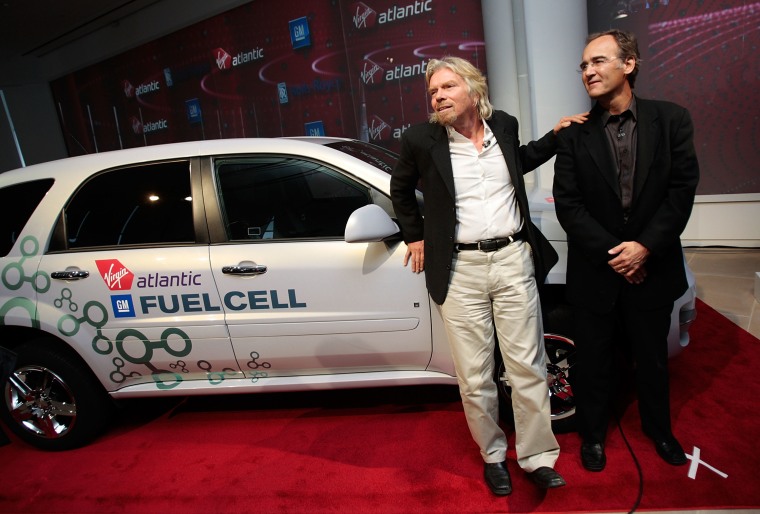Buoyed by the success of its history-making flight last week of a Boeing 747 partly fueled by biofuel, Virgin Atlantic Airways is embarking on a raft of initiatives and partnerships aimed at promoting global responsibility towards reducing carbon emissions and sustaining the environment.
These include a new partnership with General Motors to trial GM's hydrogen-fuel-cell-powered Chevrolet Equinox vehicles as part of the auto-maker's 'Project Driveway' trial of more than 100 of the zero-emission automobiles in suburban Los Angeles, New York and Washington D.C. From April, Virgin Atlantic will use three Equinox SUVs to provide complimentary ground transportation for its 'Upper Class' passengers at Los Angeles International Airport.
Another new partnership is with Rolls-Royce, which has won a $2.6 billion order from Virgin Atlantic for Trent 1000 engines to power the airline's future fleet of up to 43 Boeing 787-9 Dreamliner jets.
As part of the contract, Rolls-Royce will monitor and maintain the 787s' engines throughout their lives to ensure that they always operate at peak performance. But its new partnership with Virgin Atlantic also requires Rolls-Royce continually to research ways to reduce the engines' fuel consumption.
Meanwhile, through an in-house alternative-fuels company, the Virgin Group itself is pushing ahead to develop algae-based biofuel for use in commercial jets.
Branson issues warning
Announcing these initiatives in New York, Sir Richard Branson, founder and chairman of the Virgin Group and president of Virgin Atlantic, issued a stark warning about the consequences of ignoring environmental sustainability and not finding alternatives to oil as fuels.
"Five or six years from now, there is likely to be a demand for more fuel than there is fuel available," said Branson. The price of oil could well go to "$150 to $200" per barrel, and "the effect on the global economy could be devastating" if business — and particularly the airline industry — isn't in a position to use alternative fuels such as biofuels, he said.
Admitting his concern that "my great-grandchildren might not have a planet" if global business doesn't embrace sustainability, Branson proclaimed Virgin Atlantic's intention to be the airline-industry leader in the use of biofuels.
Last week's successful flight of a partly biofuel-powered 747 from London to Amsterdam "was actually a major breakthrough," said Branson. Two years ago, airline industry experts said "biofuel would freeze at 15,000 feet" and that airlines wouldn't be able to use it in commercial jets. Virgin Atlantic quickly proved them wrong, he said.
"The initial results back from the engines (on the 747 used for the biofuel flight) are very good," said Branson. "The next step" is to produce biofuels that can "truly" replace jet fuel in commercial aircraft. Using algae to do so is the best solution, because it produces "no effect on the food chain."
Biofuel from algae
Now, "Virgin Atlantic will move forward rapidly to produce algae" to make biofuel, said Branson. "We're talking to a lot of sewage plants about setting up algae plants above and using a lot of the CO2 coming off those sewage plants" to feed the algae.
This would create "a double-whammy effect," said Branson: The sewage plants would release far less CO2 into the atmosphere and the biofuels produced from the algae would also release far less greenhouse gases and noxious emissions than jet fuel made from oil.
Virgin Atlantic will take part in GM's recently launched Project Driveway trial throughout the remainder of the 30-month duration of the tests. After starting using the SUVs in Los Angeles next month, the airline's partnership with GM will also allow Virgin Atlantic to begin trialing them in New York as well. Virgin's trials of the fuel-cell powered vehicles will last throughout the rest of the Project Driveway program.
By taking part in the Project Driveway trials, "We will be part of the largest fuel-cell test ever," said Branson.
But while Virgin Atlantic is "constantly looking for ways to reduce carbon emissions at every stage of passengers' journeys, it's not enough, of course," he said. "We would like to see governments (particularly in the U.S. and the UK) build hydrogen filling stations in cities to let people fill up their cars."
It is no coincidence that Virgin Atlantic is trialing zero-emissions Chevrolet Equinox hydrogen fuel-cell powered vehicles in Los Angeles and New York, said Branson. Each city has a "forward-thinking" mayor and state governor keen to promote the use of alternative fuels.
Renewable-energy pumps
"As a first step, we could have renewable-energy pumps alongside regular pumps" at gas stations, the Virgin chairman said.
The Chevrolet Equinox car that GM is using in the Project Driveway trial employs GM's fourth-generation hydrogen fuel-cell technology, said Dr. Larry Burns, GM's vice president for research and development and strategic planning.
Just like a conventional automobile, the Equinox can be fully refueled in 5 to 8 minutes, said Burns. It can carry just as much in the way of passengers and cargo, meets all federal safety standards, and boasts "jet-like acceleration," he said. "It really is a real car, and technology has evolved very rapidly in that sense."
The Environmental Protection Agency has certified the Equinox as completely zero-emissions in terms of carbon and pollutants. Its only emission is water, and that in amounts "rather less" than from an internal combustion engine, said Burns.
However, he revealed that GM is now developing fifth-generation fuel-cell power train that is half the size of the existing power train for the Equinox and will be even more efficient. The new power train will easily fit into the body and chassis of the Equinox, he said.
Instead of the situation now, where automobiles are powered by fossil fuels and are controlled mechanically and hydraulically, "we see a future within our grasp where cars are powered by hydrogen and electricity, and they are controlled electronically and digitally," said Burns.
